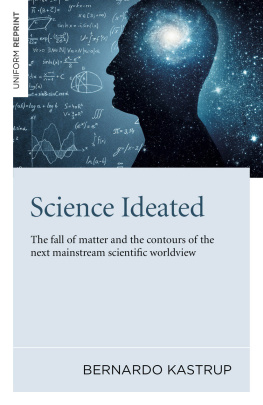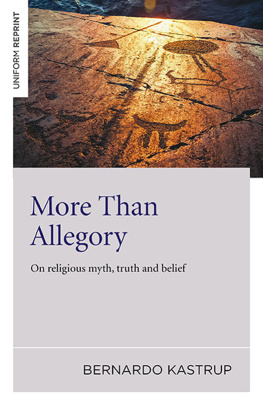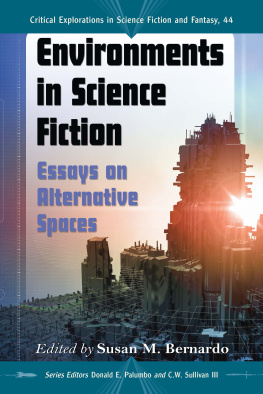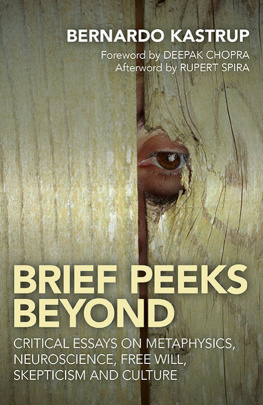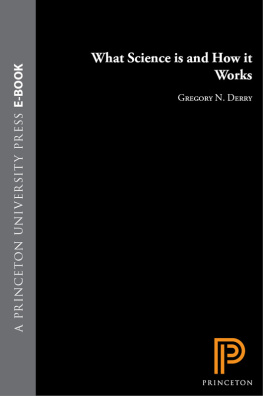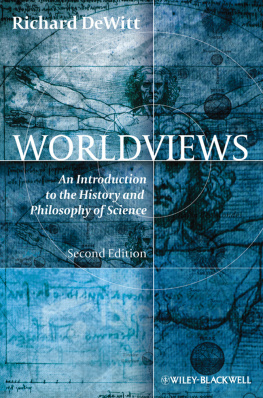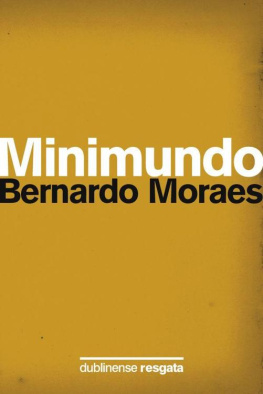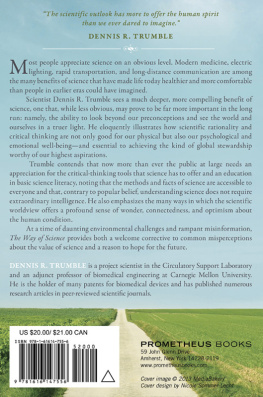Bernardo Kastrup - Science Ideated: The Fall of Matter and the Contours of the Next Mainstream Scientific Worldview
Here you can read online Bernardo Kastrup - Science Ideated: The Fall of Matter and the Contours of the Next Mainstream Scientific Worldview full text of the book (entire story) in english for free. Download pdf and epub, get meaning, cover and reviews about this ebook. year: 2021, publisher: Iff Books, genre: Religion. Description of the work, (preface) as well as reviews are available. Best literature library LitArk.com created for fans of good reading and offers a wide selection of genres:
Romance novel
Science fiction
Adventure
Detective
Science
History
Home and family
Prose
Art
Politics
Computer
Non-fiction
Religion
Business
Children
Humor
Choose a favorite category and find really read worthwhile books. Enjoy immersion in the world of imagination, feel the emotions of the characters or learn something new for yourself, make an fascinating discovery.
- Book:Science Ideated: The Fall of Matter and the Contours of the Next Mainstream Scientific Worldview
- Author:
- Publisher:Iff Books
- Genre:
- Year:2021
- Rating:3 / 5
- Favourites:Add to favourites
- Your mark:
- 60
- 1
- 2
- 3
- 4
- 5
Science Ideated: The Fall of Matter and the Contours of the Next Mainstream Scientific Worldview: summary, description and annotation
We offer to read an annotation, description, summary or preface (depends on what the author of the book "Science Ideated: The Fall of Matter and the Contours of the Next Mainstream Scientific Worldview" wrote himself). If you haven't found the necessary information about the book — write in the comments, we will try to find it.
Science Ideated: The Fall of Matter and the Contours of the Next Mainstream Scientific Worldview — read online for free the complete book (whole text) full work
Below is the text of the book, divided by pages. System saving the place of the last page read, allows you to conveniently read the book "Science Ideated: The Fall of Matter and the Contours of the Next Mainstream Scientific Worldview" online for free, without having to search again every time where you left off. Put a bookmark, and you can go to the page where you finished reading at any time.
Font size:
Interval:
Bookmark:
The fall of matter and the contours of the next mainstream scientific worldview
The fall of matter and the contours of the next mainstream scientific worldview
Bernardo Kastrup

Winchester, UK
Washington, USA

First published by iff Books, 2021
iff Books is an imprint of John Hunt Publishing Ltd., No. 3 East Street, Alresford, Hampshire SO24 9EE, UK
www.johnhuntpublishing.com
www.iff-books.com
For distributor details and how to order please visit the Ordering section on our website.
Text copyright: Bernardo Kastrup 2020
ISBN: 978 1 78904 668 7
978 1 78904 669 4 (ebook)
Library of Congress Control Number: 2020938259
All rights reserved. Except for brief quotations in critical articles or reviews, no part of this book may be reproduced in any manner without prior written permission from the publishers.
The rights of Bernardo Kastrup as author have been asserted in accordance with the Copyright, Designs and Patents Act 1988.
A CIP catalogue record for this book is available from the British Library.
Design: Stuart Davies
UK: Printed and bound by CPI Group (UK) Ltd, Croydon, CR0 4YY
Printed in North America by CPI GPS partners
Rationalist Spirituality: An exploration of the meaning of life and existence informed by logic and science
Dreamed up Reality: Diving into mind to uncover the astonishing hidden tale of nature
Meaning in Absurdity: What bizarre phenomena can tell us about the nature of reality
Why Materialism Is Baloney: How true skeptics know there is no death and fathom answers to life, the universe, and everything
Brief Peeks Beyond: Critical essays on metaphysics, neuroscience, free will, skepticism and culture
More Than Allegory: On religious myth, truth and belief
The Idea of the World: A multi-disciplinary argument for the mental nature of reality
Decoding Schopenhauers Metaphysics: The key to understanding how it solves the hard problem of consciousness and the paradoxes of quantum mechanics
Decoding Jungs Metaphysics: The archetypal semantics of an experiential universe
The story of how science and metaphysical materialism became seemingly intertwined is a curious one. Back in the seventeenth century, when science as we know it today took its first steps, scientists based their entire work onwhat else?perceptual experience: the things and phenomena they could see, touch, smell, taste or hear around them. That starting point is, of course, qualitative in nature. After all, the felt concreteness of the proverbial apple that fell on Newtons head, as well as its redness and sweetness, were sensed qualities. Everything that appears on the screen of perception is perforce qualitative. As such, the starting point of sciencethen and nowis the world of qualities that we perceive around ourselves. Even the output of perception-enhancing instruments such as microscopes and telescopes is only useful insofar as it is qualitatively perceived.
Soon, however, scientists realized that it is very convenient to describe this eminently qualitative world by means of quantities, such as weights, lengths, angles, speeds, etc. These quantities capture the relative differences between qualities. For instance, an anvil feels qualitatively heavier than a feather, a difference in felt weight that can be conveniently described with a quantity: a certain number of newtons. Today we have unitsquantitiesto describe every discernible aspect of the world, including frequency, amplitude, mass, charge, momentum, spin, etc.
But then something bizarre happened: many scientists seemingly forgot where it all started and began attributing fundamental reality only to the quantities. Because only quantities can be objectively measured, they began postulating that only mass, charge, momentum, etc., really exist out there, qualities somehow being ephemeral epiphenomenaside effectsof brain activity, existing only within the confines of our skull. This, in a nutshell, was the birth of metaphysical materialism, a philosophy thatabsurdlygrants fundamental reality to mere descriptions, while denying the reality of that which is described in the first place.
Indeed, at some point between the early seventeenth and the late nineteenth century, we began cluelessly replacing reality with its description, the territory with the map. Now we say that only matter existsi.e. things exhaustively defined in terms of quantities alonewhile the qualities of experience, which are all we ultimately have, are allegedly secondary, reducible, epiphenomenal. And so we now face the so-called hard problem of consciousness: the impossibility of explaining qualities in terms of quantities. That we find ourselves surprised at the intractability of this problem is what is dumbfounding: we defined matter as something purelyquantitativei.e. not a qualityto begin with, so its no wonder that we cant reduce qualities to matter, is it?
The hope that we will one day solve the hard problem is as foolish as hoping to reduce the territory to its map, a painter to his or her self-portrait. The hard problem must be seen through and circumvented, not solved. Our present metaphysical dilemmasas well as the story that brought us to them, as briefly outlined abovewould be comical if they werent tragic. In the space of only a couple of centuries, we tied ourselves up in hopelessly abstract conceptual knots and managed to lose touch with reality altogether.
If science is to progress beyond its present dilemmasfrom those in the neuroscience of consciousness to those in the foundations of quantum mechanics, which have their roots in the same conceptual misstep described abovewe must undo the knots and place our feet back on firm ground. This book is an attempt to help us do just that.
Indeed, leading-edge empirical observations are increasingly difficult to reconcile with metaphysical materialism. Laboratory results in quantum mechanics, for instance, strongly indicate that there is no autonomous material world of tables and chairs out there. Coupled with the inability of materialist neuroscience to explain experience, this is finally forcing us to reexamine our early assumptions and contemplate alternatives. Analytic idealismthe notion that reality, while equally amenable to scientific inquiry, is fundamentally qualitativeis a leading contender to replace metaphysical materialism.
In this book, the broad body of empirical evidence and reasoning in favor of analytic idealism is reviewed in an accessible manner. The book consists of a compact collection of essays written between 2017 and 2020. The original versions of most of them have previously been published in preeminent magazines and journalssuch as Scientific American, the Journal of Near-Death Studies, IAI News (the online magazine of the Institute of Art and Ideas), the Blog of the American Philosophical Association and Science and Nondualityas well as my own blog. They are collected here in a convenient format, ordered and grouped together in a manner that facilitates their understanding.
The essays have been revised, updated and sometimes extended. Often the original versions had to comply with editorial preferences not my own, whereas the versions in this book are my preferred ones: the directors cut, so to speak, reflecting my true tone and style. Two never-before-published essays are also included: Why Does Nature Mirror Our Reasoning? (Chapter 23) and Is Life More Than Physics? (Chapter 24).
Font size:
Interval:
Bookmark:
Similar books «Science Ideated: The Fall of Matter and the Contours of the Next Mainstream Scientific Worldview»
Look at similar books to Science Ideated: The Fall of Matter and the Contours of the Next Mainstream Scientific Worldview. We have selected literature similar in name and meaning in the hope of providing readers with more options to find new, interesting, not yet read works.
Discussion, reviews of the book Science Ideated: The Fall of Matter and the Contours of the Next Mainstream Scientific Worldview and just readers' own opinions. Leave your comments, write what you think about the work, its meaning or the main characters. Specify what exactly you liked and what you didn't like, and why you think so.

